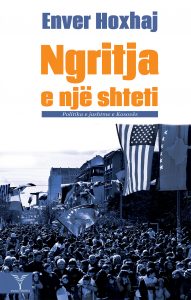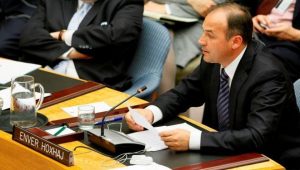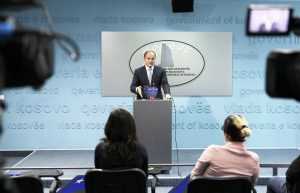Foreign Affairs Minister Enver Hoxhaj’s new book incorrectly employs mainstream IR theory to discuss Kosovo’s foreign policy and falls short on explaining –and even misrepresents– the country’s diplomatic efforts.
Not many authors have written books about Kosovo’s foreign policy covering its post-independence period, a task which Enver Hoxhaj has undertaken in his recent book “Ngritja e një Shteti: Politika e Jashtme e Kosovës” (The Rise of a State: Kosovo’s Foreign Policy), published by Botimet Dudaj (2016). In three parts and 15 chapters, the book attempts to call for “strategic thinking” within Kosovo’s foreign policy making circles.
The first part of the book sets the general scene of Kosovo’s position in international relations; it incorporates some existing conceptual frameworks from International Relations, IR, literature, such as “small states,” “hard power,” “soft power,” and “smart power,” and it includes a brief discussion on the three major paradigms in IR theory – namely realism, liberalism, and constructivism. The first part of the book then continues to engage with these concepts and theories and how they relate to Kosovo’s behavior in international relations after it gained its independence.
The second part of the book is mainly a descriptive account of Kosovo’s position in the international system. The purpose of this part of the book is to show the “unique character” of Kosovo’s foreign policy (pp.103-110). It is “unique,” according to the book, because of the challenges that Kosovo faces with its lack of UN membership, its efforts to gain recognitions, and its problematic relations with its former “parent state,” Serbia – issues that fully-fledged states (UN member states) do not have to deal with. This part of the book also speaks about Kosovo’s “partners” and “adversaries.” The “adversaries” are spoken of very critically, and the author laments about how some of the non-recognizers have not correctly understood Kosovo’s sui generis case.

“Ngritja e një shteti”
Enver Hoxhaj,
Tiranë: Botimet Dudaj.
2016.
Unlike the descriptive touch of the first two parts of the book, which account for the bulk of its content (pp. 21-300), it is the third and last part that takes a more analytical turn. This part of the book, in addition to repeating and summarizing much of the previous two parts, raises some important issues in regards to Kosovo’s foreign policy towards: (1) the region, (3) the Euro-Atlantic structures, and (3) UN membership. Of special interest here is some analysis in regards to scenarios for Kosovo’s membership in the UN, which, according to the book, is one of the ultimate priorities and goals of Kosovo’s foreign policy. This is because:
“If a place like Kosovo does not accomplish its vital international interests of becoming a member of the UN and integrating into Euro-Atlantic structures within a certain period, it risks its very existence as a state” (p.309).
What would this “certain period” be? It is “one decade,” as Hoxhaj later mentions (p.319, p.321), and if the current status quo of isolation and non-membership continues, Hoxhaj suggests, “the idea of national unification [with Albania] remains an inevitable reaction” (319). Hoxhaj also asserts that the very “adversaries” (Russia and Serbia) who are blocking Kosovo’s membership into the UN, may as a result, create an outcome of Albanian national unification, which according to him, is desirable neither for Serbia nor for Russia. This part also parades as a half-hearted ultimatum to the international community to accept Kosovo as a sovereign state with equal rights and duties as other states. Hoxhaj also presents a proposal for a “Peace Treaty” with Serbia (p.325), and ends with an optimistic tone about “small states” in general who should never give up on achieving their national interests.

Enver Hoxhaj at the UN SC in 2012. | Photo: UN.
The book has some problems and weaknesses which can be grouped under three counts, namely (1) its engagement with IR theory, (2) the use of some concepts, and (3) some of its analysis.
The book quite strangely attempts to engage with three IR theories: realism, liberalism, and constructivism. It says that Kosovo has used them as “an integrated intellectual framework of its foreign policy” (p. 91), and that realism has been used as a “guide” to its foreign policy making (p. 92). In the conclusion, Hoxhaj even says that, as a Foreign Minister, depending on the time of day, he has been a realist, a liberal, and a constructivist, all in a single day!
Hoxhaj’s suggestion that Kosovo decided to act according to any of these theories is theoretically a problematic outlook on IR theory in and of itself.
The problem with the book here lies with the fact that these three (mainstream) IR theories have very little prescriptive outlook. One can analyze and interpret a certain state’s behavior according to one or more of these theoretical lenses to arrive to a conclusion as to which of the theories would best describe or explain how a state (in this case Kosovo) has acted, when and on what issue. But it would be difficult for a statesman to wake up in the morning and take a decision based on any of these theories (there are other normative theories which can help you in that, but the book does not mention those).
Mainstream IR theories provide the tools to examine retrospectively, and give almost no prescription on how one should act. To put this in more brutal terms: one can explain gravity through Newton’s theory or Einstein’s theory of relativity, but one cannot decide whether they want to act upon this or that theory of gravity when they wake up next day. So, Hoxhaj’s suggestion that Kosovo decided to act according to any of these theories is theoretically a problematic outlook on IR theory in and of itself.

Minister Hoxhaj attending the Diaspora Summit in Tirana, Albania, November 2016. | Photo courtesy of the Kosovo MFA.
The three theories can certainly provide enough food to explain Kosovo’s behavior, but not as the book suggests. When the book asserts that realism has been its theoretical guide (leaving aside its prescriptive tone), this does not live up to reality.
Citing some relevant realists, the book summarizes realism quite correctly, i.e. it presupposes that states act out of self-interest, protect their sovereignty and territorial integrity, maximize their security, and so on.
However, it would be difficult to explain Kosovo’s foreign policy through realism, as Hoxhaj suggests, because its sovereignty is disputed by many of those who are responsible to protect its territorial integrity (KFOR/NATO) in the first place. Realism would suggest that, when states are small and weak, they balance against the stronger adversaries. In reality, Kosovo has not balanced against the stronger adversaries (in this case Serbia or Russia) because it relies mostly on multilateral protection (mechanisms that are divided on Kosovo’s very sovereignty and statehood). Furthermore, Kosovo does not have a binding defense agreement, neither with these multilateral bodies that “protect” it from Serbia nor with any other state. In fact, the very multilateral bodies (KFOR/NATO) that “protect” Kosovo have an agreement with Serbia (not with Kosovo) to “protect” Kosovo (The 1999 Military Technical Agreement between NATO and the former FRY/Serbia). So, its security and protection (KFOR/NATO through the Resolution 1244) depend also on two of its “adversaries,” Russia and Serbia, and not only on its “partners.” Realism simply goes bust here. (I use here the book’s categorization of “partners” and “adversaries”).
The ruling elite is manifold richer, stronger, and more secure compared to the period before independence or liberation. It is difficult to say the same for Kosovo as a state, disengaged from its society, while highly embroiled around the ruling elite.
Can realism explain Kosovo’s behavior, or a part of it, after independence? Yes, but one needs to move beyond IR theory and meet its sub-discipline of Foreign Policy Analysis, which the book ignores. In fact, realism could best explain Kosovo’s foreign policy by engaging with the behavioral outcomes of the ruling elite.
Liberalism and Constructivism could partially explain how Kosovo has engaged with the international system ever since it declared its independence. It has followed policies which embrace individualism, letting the free market rule more than the state or various communities, far more than in the Western experience, and has sought membership in international organizations that embrace and promote such policies.
As for the outcome, it would be difficult, at the moment, to assess the benefits for Kosovo (there certainly could be some), but what one can conclude more confidently is that the benefits have certainly gravitated mostly towards the ruling elite. The ruling elite is manifold richer, stronger, and more secure compared to the period before independence (2008) or liberation (1999). It is difficult to say the same for Kosovo as a state, disengaged from its society, while highly embroiled around the ruling elite.
Constructivism, on the other hand, could best capture Kosovo’s behavior after its independence if we are to compare it with realism and liberalism. Sovereignty, to steal from Alexander Wendt’s terminology, has been only what one (ruling elite and part of society) made of it.
Realism could best explain the ruling elite’s behavior vis-à-vis the state and the fundamental outcome of its foreign policy. While free to interpret and construct what “sovereignty,” “national interest,” and “security,” mean, judging by the outcomes, one can speak more about the ruling elite’s strength, sovereignty, interests, and their very personal and clan security.
Another issue with the book is a conceptual one. Although Hoxhaj quite frequently uses Joseph Nye’s concepts of “soft-,” “hard-,” and “smart power,” the book alludes that Kosovo has been using “smart power” to achieve its interests. Since “smart power” is a combination of both soft and hard powers, it would be difficult to argue that Kosovo, which has no military to protect itself or intelligence working abroad, could use anything but “soft power.” Instead of a synthesis between the two powers, Hoxhaj seems to suggest that “smart power” is about being or acting smart – an obvious misrepresentation of Nye’s concept.
Another striking element is the book’s take on the International Court of Justice’s, ICJ, 2010 decision on Kosovo’s declaration of independence as legitimate – which indubitably was the high point of Kosovo’s foreign policy. In the book, the ICJ’s decision is interpreted as “the sure fact of Kosovo’s statehood,” which also gave way to oppose the re-negotiation of its status (p.80). But there is a major gap in this analysis, as the book fails to explain why then did Kosovo start negotiating with Serbia a little more than six months after ICJ’s decision, if it proved that its status was non-negotiable?
The book also suggests that the ICJ’s favorable opinion on Kosovo was utilized well by Kosovo’s foreign policy making circles, as it brought more recognitions and memberships in various international organizations. But there is no proof or solid discussion that the book brings in to support such a claim.
In fact, the opposite can be argued – Kosovo has utilized ICJ’s opinion very poorly. Six years since the decision, around 40 recognitions have been gained, compared to around 70 which came only within two years after the declaration of independence. The higher number of early recognitions is understandable and has nothing to do with the ICJ’s decision, but claiming that the ICJ’s decision was utilized efficiently by Kosovo is a stretch.
The book does not manage to establish a convincing link between the ICJ’s opinion and subsequent recognitions. In fact, the contrary can be said. Kosovo agreed to remove the designation “Republic,” – the very designation that represents the country’s claim to statehood – in international representation. Instead it got a footnote, a disclaimer attached to its name referencing the internationally legally binding 1244 UN Security Council Resolution claiming Serbia’s sovereignty over Kosovo, an international legally non-binding ICJ’s decision favorable to Kosovo, and most strikingly, that parties (including Kosovo) are without prejudice to its status.
In the end, Kosovo agreed to not judge its own status, not even as an independent state, despite ICJ’s favorable opinion on its independence. The book does not discuss how the very restart of the negotiations with Serbia and the footnote–through which Kosovo does not honor its own status as an independent state–must have affected the poor foreign policy record in terms of recognitions and its international subjectivity.

Upon returning from a trip to New York in September 2016, Hoxhaj claimed that three countries would recognize Kosovo by the end of the year. Only Singapore did so. | Photo courtesy of Kosovo MFA.
Nonetheless, Hoxhaj manages to admit to some of the poor records in Kosovo’s foreign policy making. But in none of the book’s more than 400 pages is any poor performance attributed to Kosovo’s foreign policy making circles themselves. Why did Kosovo perform poorly when it did? According to the book, the problems lied with: (1) the former President Fatmir Sejdiu (a LDK veteran); (2) Dick Marty; (3) the non-PDK political parties who created a coalition against the PDK in 2014; and (4) again the opposition in 2015, when they refused to accept the agreement on the Association of the Serb Majority Municipalities and the Border Demarcation Agreement with Montenegro.
According to Hoxhaj, poor performance in foreign policy was not PDK-related. The major foreign policy fiasco with the failure of attaining membership in UNESCO lies with no one, and this is discussed in only 2.5 lines in the book (p. 157).
One of the important points, and the key analytical theme of the book, is its discussion on some of the scenarios that Kosovo should or should not follow in its path towards UN membership – a vital national interest for Kosovo, according to the book. There are two scenarios that the book discusses.
The book falls short in providing a succinct analysis on Kosovo’s future (non)membership to the UN, especially because it draws lessons from examples that have very little in common with Kosovo.
The first is the gradual integration within the “UN system” through membership in UN agencies and programs (p. 319). The second is UN membership through the UN General Assembly and the UN Security Council (p. 319). The first, as the book later indicates, would be an option whereby Kosovo acquires observer status in the UN without the right to vote, a status currently held by Palestine, the Vatican, and some international organizations. The book considers this option as a potentially damaging one, and gives some reasonable remarks for this, although they too are debatable. The second option, full UN membership, is the one that Kosovo should prioritize over the first.
To be able to materialize the second option, Hoxhaj proposes a new pragmatism that Kosovo should take in relation to Russia and China, whereby some sort of bilateral relations might be established. Yet, he fails to provide a reason why Russia – heretofore labeled as an “adversarial” state – would ever want to establish bilateral relations with Kosovo.
The book falls short in providing a succinct analysis on Kosovo’s future (non)membership to the UN, especially because it draws lessons from examples that have very little in common with Kosovo.
Although in academic inquiry it might be interesting and perhaps useful to compare why Switzerland, Austria, South and North Korea, Western and Eastern Germany remained out of the UN, which the book considers, it is not clear at all what Kosovo’s policy making has to gain from such a digression.
Switzerland decided not to join the UN itself, while the formerly divided Germany and North and South Korea were all outside the UN system to begin with, and joined it only after reaching an agreement amongst themselves as non-UN member states.
Kosovo still operates in a different context, because it is not negotiating its UN membership with another non-UN member, but with Serbia, which is already a UN member, and has a pretty good partner to block Kosovo’s membership bid (Russia). It is interesting how the book escapes to draw examples and potential policy clues on how to survive without UN membership from the very cases that managed to survive, albeit with different natures and characteristics in terms of prospects and functionality (e.g. Taiwan, Palestine, Northern Cyprus, Somaliland, etc.) Drawing from these cases does not mean that one should follow their policies, but surely they represent a much better understanding for Kosovo’s context than the cases the book tries to use unintelligibly.
Yet, Hoxhaj insists on the very unrealistic UN membership in the next decade for Kosovo to survive as a state, and escapes from proposing some genuine defense agreement (outside KFOR and Resolution 1244) with one or two of its main partners.
Taiwan for instance has managed to survive, despite having little more than 20 recognitions and its growing adversary – China – threatening to take over it. Well, this is partly because it has developed an effective defense mechanism of its own, and partly, but most importantly it has an explicit defense agreement signed with the United States. A similar policy prescription does not enter the book’s analysis, despite the fact that it gives a realistic description of a troubled world unfolding in front of us.
If the book would attempt to discuss something similar to this, it would probably have difficulties in providing an answer, and that is because its author, the longest serving Kosovo Minister of Foreign Affairs, fails to explain why Kosovo’s foreign policy makers have decided to have less than a dozen foreign and defense policy staff stationed in the US (including drivers and administrative staff). Now with Trump in power, Kosovo’s flimsy foreign policy approach towards the United States would certainly increase the country’s prospect of (proper) survival. Only a handful of diplomats are assigned to Germany, France, and the UK, which the author of the book considers to be the country’s key partners.
A much more serious engagement (especially in the defense sector) should be undertaken with the book’s list of “partners” than what Hoxhaj suggests in his book – should Kosovo survive properly without UN membership, in an ever unpredictable region, Euro-atlanticism, and the world itself.
Shpend Kursani is a PhD researcher in the Department of Social and Political Sciences at the European University Institute, where he researches post-1945 cases of contested states





